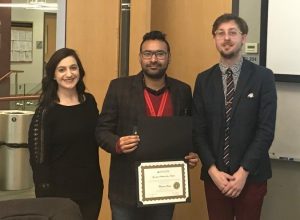**from the Graduate Student Association**

Manpreet Singh is our inaugural Student of the Month for the Graduate Student Association for the Month of October/November-2019. Presently, Singh is a 2nd year PhD candidate in the department of Mechanical Engineering working at Bioheat Transfer Laboratory, UMBC under the supervision of Dr. Liang Zhu (Principal Investigator) on a National Science Foundation project title “Mild Hyperthermia to enhance delivery of therapeutic nanocarriers in tumors: imaging, in vivo study, and simulation”. Singh is presently developing integrated computationally-predictive models based on in-vivo laboratory experiments on PC3 tumors to understand the interplay between different nanoparticle-mediated heat and mass transport mechanisms. His research explains the correlation among blood perfusion, permeability, porosity, interstitial fluid pressure, diffusion, accumulation, retention, penetration, and vascular tortuosity affected by heating and providing means to extrapolate the in-vivo results from mouse models to clinical applications.
Singh added that the clinical translation of cancer nanomedicine may become feasible by targeting tumour pathophysiological micro-environment with nanoparticles. Tailoring nanoparticles with chemotherapeutics induce synergistic effect which may be considered as “paradigm shift” in cancer invasion. Heterogeneous perfusion, increased vascular tortuosity, inhomogeneity, and high interstitial fluid pressure impairs nanoparticles in their uptake, accumulation, retention and penetration inside deep-seated tumours. This thereby hampers the delivery of targeting moieties at effective concentrations. Under normothermic temperature conditions (34°C-39°C), nanoparticles do not cross vascular wall while mild hyperthermia (40°C-42°C) significantly improves extravasation by dilating the vessels and thereby increase the tumour vascular pore size and reduce interstitial fluid pressure. The ultimate goal of his research is to develop a drug delivery method that can be customized for the needs of individual cancer patients to enhance quality of life.
Manpreet came from a small village, Mullanpur Garibdass, Mohali district, Punjab in India. Despite several other offers and opportunities around globe, he chose UMBC because of the high research impact of the Bioheat Transfer Lab. One of his favorite things about UMBC is that the administration is very approachable and listens to the concerns of students.
Manpreet is also working as Assistant Medical Physicist at Maryland Proton Treatment Center (MPTC), University of Maryland School of Medicine in evenings through the UMBC, Career Center’s authorized Curriculum Practicum Training program. Singh is independently providing clinical professional service to ensure that right amount of dose to be delivered to right location as part of treatment planning. Also, Singh is doing patient-specific plan verification measurements/ calculations ensuring safety, quality assurance and assists the interdisciplinary medical physics team with the development of customized software tools. Maryland Proton Treatment Center, is one of the fewer radiation oncology clinics throughout the USA providing thermal therapy at 40-44°C (thermotherapy) and proton therapy under one roof. Apart from his PhD responsibilities, in the Summer of 2019, he worked under the supervision of Dr. Dario Rodrigues, Assistant Professor Radiation Oncology, UMD to design hyperthermia applicators with his computational learnings at UMBC.
Further, Singh shares his interests to file a patent for “Glioblastoma- a deadliest brain cancer” through his device “CeriseEnov” which is capable of simplifying cancer care. He said bringing interdisciplinary disciplines to collectively act together will definitely help in better prognosis and thus better treatment outcomes in near future.
Manpreet was chosen because of his outstanding work ethic, sincerity and upon recommendation by his peers, as well as Dr. Jeff Halverson, Associate Dean of the Graduate School. He was also recently featured in National Newspapers in India (Hindustan Times, Tribune).
Two of his favorite quotes are “Arise, Awake, and Stop Not Until your Goal is Achieved” and “Dream is not that you see in sleep, Dream is something which does not let you sleep”.
You can follow GSA on Twitter @umbcgsa, Instagram @umbc_gsa, and Facebook @UMBCGSA. Manpreet will be hosting a social media takeover day in the near future for us to learn about his typical day in the lab. So stay tuned!
If you know of a graduate student who is doing amazing work—either for the community or towards their studies– please send an email to gsa@umbc.edu to nominate for a future Graduate Student of the Month.
Image, Left to right: Deanna Cerquetti, GSA Vice President; Manpreet Singh, Alex Rittle; GSA President
More on how to nominate students: https://gsa.umbc.edu/gsa-awards/
